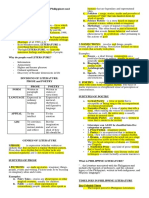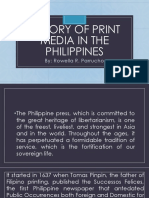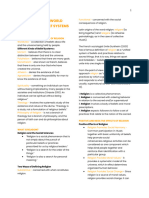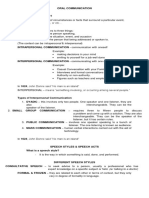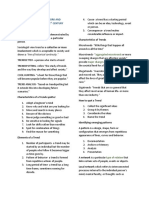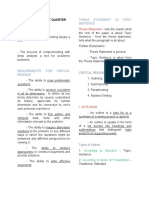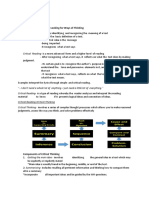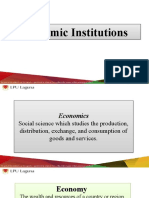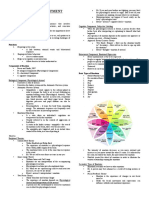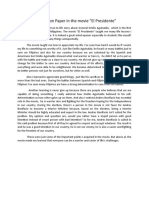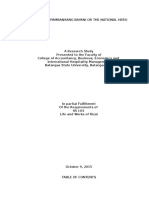100%(1)100% found this document useful (1 vote)
1K viewsDiss Reviewer 2ND Quarter
Diss Reviewer 2ND Quarter
Uploaded by
Christian Lorence LubayThis document discusses psychoanalysis and rational choice theory. It provides an overview of Sigmund Freud and the fundamental assumptions of psychoanalytic theory, including the structure of personality consisting of the id, ego, and superego. It then defines defense mechanisms like rationalization, intellectualization, and reaction formation. The document also summarizes rational choice theory, which views people as making rational choices to maximize benefits and minimize costs. It discusses assumptions of rational choice theory and different types of preferences and institutions.
Copyright:
© All Rights Reserved
Available Formats
Download as DOCX, PDF, TXT or read online from Scribd
Diss Reviewer 2ND Quarter
Diss Reviewer 2ND Quarter
Uploaded by
Christian Lorence Lubay100%(1)100% found this document useful (1 vote)
1K views9 pagesThis document discusses psychoanalysis and rational choice theory. It provides an overview of Sigmund Freud and the fundamental assumptions of psychoanalytic theory, including the structure of personality consisting of the id, ego, and superego. It then defines defense mechanisms like rationalization, intellectualization, and reaction formation. The document also summarizes rational choice theory, which views people as making rational choices to maximize benefits and minimize costs. It discusses assumptions of rational choice theory and different types of preferences and institutions.
Original Title
DISS-REVIEWER-2ND-QUARTER
Copyright
© © All Rights Reserved
Available Formats
DOCX, PDF, TXT or read online from Scribd
Share this document
Did you find this document useful?
Is this content inappropriate?
This document discusses psychoanalysis and rational choice theory. It provides an overview of Sigmund Freud and the fundamental assumptions of psychoanalytic theory, including the structure of personality consisting of the id, ego, and superego. It then defines defense mechanisms like rationalization, intellectualization, and reaction formation. The document also summarizes rational choice theory, which views people as making rational choices to maximize benefits and minimize costs. It discusses assumptions of rational choice theory and different types of preferences and institutions.
Copyright:
© All Rights Reserved
Available Formats
Download as DOCX, PDF, TXT or read online from Scribd
Download as docx, pdf, or txt
100%(1)100% found this document useful (1 vote)
1K views9 pagesDiss Reviewer 2ND Quarter
Diss Reviewer 2ND Quarter
Uploaded by
Christian Lorence LubayThis document discusses psychoanalysis and rational choice theory. It provides an overview of Sigmund Freud and the fundamental assumptions of psychoanalytic theory, including the structure of personality consisting of the id, ego, and superego. It then defines defense mechanisms like rationalization, intellectualization, and reaction formation. The document also summarizes rational choice theory, which views people as making rational choices to maximize benefits and minimize costs. It discusses assumptions of rational choice theory and different types of preferences and institutions.
Copyright:
© All Rights Reserved
Available Formats
Download as DOCX, PDF, TXT or read online from Scribd
Download as docx, pdf, or txt
You are on page 1of 9
DISS NOTES/REVIEWER FOR 2ND - Coping technique that lessens
QUARTER anxiety or pain
PSYCHOANALYSIS TYPES OF DEFENSE MECHANISM
- Refers both to a theory of how the 1. RATIONALIZATION
mind works and a treatment modality - This is positioning something into a
different light or offering a different
- It helps people to understand explanation for one’s behaviours in
themselves, their relationships, and the face of a changing reality
how they behave in the world
2. INTELLECTUALIZATION
- Rather than deal with the painful
SIGMUND FREUD
associated emotions, a person
- Founder of psychoanalysis distance oneself from the event or
behaviour by using reasoning to
- First person to include the block emotions
unconscious mind in a formal
psychological theory 3. REACTION FORMATION
- Converting of unwanted or
dangerous thoughts, feelings or
FUNDAMENTAL ASSUMPTIONS IN impulses into their opposites
PSYCHOANALYTIC THEORY
- Human mind is like a hydraulic 4. ACTING OUT
system, operating by internal - Performing an extreme behaviour in
pressure order to express feelings the person
- Personality changes occurs with feels incapable of otherwise
redirection of person’s psychic expressing
energy
- Unconscious mind 5. PROJECTION
- Unconscious - Missattribution of a persons
- Human mind consists of three parts: undesired thoughts, feelings into
CONSCIOUS, PRE-CONSCIOUS, another person who does not have
UNCONSCIOUS those thoughts and feelings
- Psychic determinism: nothing
happens by chance 6. REGRESSION
- Structure of personality: ID, EGO, - Seeking the security of an early
SUPEREGO developmental stage
STRUCTURE OF PERSONALITY 7. COMPARTMENTALIZATION
- Parts of oneself are separated from
1. ID
awareness of the other parts and
- Unconscious: It is the person’s
behaving as if one has separate sets
desires and instinct
of values
- It operates on “pleasure principle”
- The ID says “I want it now”
8. DISASSOCIATION
- A person losses track of time, and
2. SUPEREGO
instead finds another representation
- Operates on “moral principle”
of their self in order to continue in
- It strives for perfection and not
the moment
pleasure
- Decides what is right or wrong
9. DISPLACEMENT
- The superego says “nice people
- Negative feelings or thoughts are
don’t do that”
displaced or directed to a safer
target
3. EGO
- Mediator
10. SUBLIMATION
- Operates on “reality principle”
- Diverting an unacceptable feeling to
- Resolves conflict between ID and
a socially desirable one
Superego
- The ego says “Maybe Ii can find a
11. COMPENSATION
compromise”
- The process of psychologically
DEFENSE MECHANISM counterbalancing perceived
weakness by emphasizing strength - An individual has sufficient
in other areas information upon which to establish
her preferences and perform her
12. REPRESSION rational analysis
- Unconscious forgetting
13. SPLITTING - Preferences are transitive in nature.
- Everything in the world is seen as all This is a logical principle that sounds
good or all bad with nothing in more complicated than it really is.
between
STRENGTH
14. USING HUMOR - This approach is strikingly general. It
- Focusing on funny aspects of a has been used to analyse not only
painful situation because one would about traditional economic matters
not like to face the real problem
WEAKNESS
15. USING ALTRUISM - HERBERT SIMON says that people
- Handling your own pain by helping are not always able to obtain all the
others information they would need to make
the best possible decision
16. DENIAL
- Ego refuses to acknowledge anxiety INSTITUTIONALISM
provoking situations
INSTITUTIONS
- Are social structure that have
RATIONAL CHOICE THEORY attained a high degree or resilience
(Scott 2001)
- Was pioneered by sociologist
GEORGE HOMANS - They are composed of cultural-
cognitive, normative and regulative
- Is the view that people behave as elements that together with
they because they believe that associated activities and resources,
performing their choses actions has provide stability and meaning to
more benefits than costs social life
- That is, people make rational
choices based on the goal, and
these govern their behaviour - Provide the rules, guidelines and
structures needed to carry out
- Assumes that an individual has everyday activities. The main job of
preferences among the available an institution is to regulate three
choice alternative that allow them to parts of the society, these are the
state which option they prefer 1. ECONOMY – careful of money
TWO TYPES OF PREFERENCES and resources
2. POLITICS – actions and policies
1. COMPLETE of a government
- The person can always say which of 3. IDEOLOGIES – set of ideas and
two alternatives they consider beliefs of a group
preferable or that neither is preferred
to the other TWO KINDS OF INSTITUTIONS
FORMAL INSTITUTIONS
2. TRANSITIVE
- If option A Is preferred over option B - Are those officially established by
and option B is preferred over option the government
C, the A is preferred over C - Deliberately created by people n
society to satisfy basic need for
ASSUMPTIONS existence
- An individual acts rationally in EXAMPLES
pursuit of their own self - interest 1. The Philippine Government
and not in the interests of others. 2. Bangko Sentra lng Pilipinas
Individuals seek to maximize their (BSP)
gains and minimizes their losses 3. NEDA, PSA, DFA, DOT, DPWH
ETC.
INFORMAL INSTITUTIONS 2. Banta Bata Foundation
3. Gawad Kalinga Foundation
- Are not officially established, but one
practices commonly accepted OLD INSTITUTIONALISM
throughout the society
- Studies formal institutions that are
- Informal institutions have set of rules
supported by the government
that are also anchored on the formal
- It is more studied in the field of
institutions
Political science
NEW INSTITUSIONALISM
NGO
- Refers to studying institutions and
- Any non-profit, voluntary citizen’s
how it affects the society or the
group which is organized on a local,
social behaviour
national or international
- It is a theory that develops a
- Task oriented and driven by people
sociological view on institution
with common interest
- Perform a variety of service and
humanitarian functions, bring citizen
concerns to government FEMINIST THEORY
- Some are organized around specific FEMINISM
issues, such as human rights,
environment and health - Is the belief that women should have
EXAMPLES: equal rights to men
1. Habitat for Humanity (HFHP) - The feminist movement fights for
2. Philippine Red cross equal rights and opportunities for
3. Child hope Asia women
FEMINIST THEORY
PO - An outgrowth of the general
movement to empower women
- Bona fide associations of citizens worldwide
with demonstrated capacity to - Aims to understand the nature of
promote the public interest and with gender inequality
identifiable leadership, membership - Fight for the equality of women and
and structure. Members come from argue that women should share
all sectors of society including the equality in society’s opportunities
poor and the disadvantaged and scarce resources
EXAMPLES:
1. World Vision Philippine THREE WAVES IN DESCRIBING THE
2. Green Peace Philippines HISTORY OF FEMINISM
3. Philippine Animal Welfare
FIRST WAVE FEMINISM
Society
- Talks about women suffrage, right to
COMMUNITY ORGANIZATION
vote
- Can represent both community-
SECOND WAVE FEMINISM
based organizations, operating as
shared work space or shared - Broadened to debate to a wide
experience or concerns. Within range of issues: sexuality, family, the
community-based organizations, work place and reproductive rights
there are many variations in terms of - Focused heavily on critiquing sex
size and organizational structure workers and pornography
EXAMPLES:
1. KALIPI THIRD WAVE FEMINISM
2. 4H Club in The Philippines - Spearheaded a reproductive rights
3. R.I.C movement that treated reproduction
FOUNDATION as more than just access to birth
control and abortion rights
- Defined as an organization set up to
finance or complete projects, usually KINDS OF FEMINIST THEORY
for a non-profit organization such as LIBERAL FEMINIST
a school or church
EXAMPLES: - Argue that society holds the false
1. ABS-CBN Foundation belief that women are, by nature,
less intellectually and physically
capable than me; thus it tends to 4) PATRICIA HILL COLLINS
discriminate against women in the - Focused on understanding, in her
academy, the forum and the own words; “How African American
marketplace male and female youth’s experience
- They strive for sexual equality via with social issues of education,
political and legal reform unemployment, popular culture and
political activism articulate with
MARXIST FEMINISM
global phenomenon, specifically
- Gender oppression is closely related complex social inequalities, global
to class oppression capitalist development,
- The relationship between men and transnationalism and political
women in society is similar to the activism”
relations between proletariat and
bourgeoisie. 5) ANNESTINE BEYER
- Pioneer of women’s education
RADICAL FEMINISM
Issues engaged by radical feminist include:
HUMAN ENVIRONMENT SYSTEMS
- Reproductive rights for women
- Understanding pornography as an - Humans have the capacity to
industry that leads to harm women interact with its environment
- Understanding that rape is to show - Human and the environment has
expressional patriarchal power and their “mutual” interaction with each
not a seeking of sex other
- Understanding prostitution under - Humans have the capacity to
patriarchy as oppression of women, change or influence the balance of
sexually and economically the ecosystem while the
- That institutions, including the environment also have the capacity
government and religion, as to influence the behaviour of the
centered historically in patriarchal society
power - Humans can either destroy or
- A critique of motherhood, marriage, recreate the ecosystem by means of
the nuclear family and sexuality. tampering its natural landscape
Questioning how much of our culture - The environment can influence the
is based on patriarchal assumption culture of the society by means of
creating norms and beliefs
SOCIALIST FEMINISM
COUPLED HUMAN-ENVIRONMENT
- The first objective is often referring SYSTEM (ALSO KNOWN AS A COUPLED
to women’s limited roles in society, HUMAN AND NATURAL SYSTEM OR
staying at home and raising a family, CHANS)
as a major factor in their oppression
- The second objective aims to show - Characterizes the dynamical two-
that women can experience it in way interactions between human
various other ways, including race, systems
class, sexual orientation and
ENVIRONMENTAL ISSUES
education among others.
- Humans tend to regard the
NOTABLE FEMINIST
environment as a never ending
1) SANDRA HARDING source of materials and energy
- Criticizes all sociological theories - Many of the environmental issues of
claiming they are all gender-biased today relate to human’s over use of
finite resources for economic
2) ELIZABETH GARETT ANDERSON development
- First Englishwomen to qualify as a
HUMAN OVERPOPULATION
physician and surgeon in the UK; co-
founder of first hospital staffed by 1. Water scarcity
women 2. Land Reclamation
3. Land Degradation
3) SIMONE de BEAUVOIR 4. Waste disposal management
- Writer of “The second sex” 5. Urbanization
- Discusses the treatment of women 6. Industrialization
throughout history
INSTENSIVE FARMING - Filipinos believed they must live up
to the accepted standards of
1. Intensive animal farming
behaviours and if they fail to do so
2. Intensive crop farming
they bring shame not only upon
3. Pesticide drift
themselves but also upon their
4. Plasticulture
family
5. Slash and burn
6. Deforestation
3. RELATIONSHIPS AND
HYDROLOGY COMMUNICATIONS
- Filipinos thrive on interpersonal
1. Flooding relationships so it is advisable to be
2. Landslide introduces by a third party
STRENGTHS
- Filipinos want to behave a smooth
- It provides a bigger view of looking interpersonal relationship with other
of environmental issues people
- It highlights the importance of
synergy of the human society and PHILIPPINE VALUES
the environment - Many Filipino remain committed to a
- It looks at the human agency as strong family system
users and protectors of the
environment - Popular values – paggalang,
INSTITUTE OF PHILIPPINE CULTURE’S pakikisama
STUDY ON PHILIPPINE VALUES
PHILIPPINE VALUES - Hospitality and sharing to make
- Object of positive attitude another feel important
- Explicit, distinctive characteristics of - Pakikisama, hiya, utang na loob,
a group delicadeza, mapagbigay,
makiramay, pagtitiis, pagtitimpi
VALUES
- The object of positive attitude. The
- Ideal companion – pagkamaunawain
goal which a man tends to, goal, the
kabaitan, pagtitiwala,
vision of which motivates him to
pagkamaaalalahin,
action, thing that people want
pagkamagagalang, pagkamatiyaga,
(Bulatao in Talisayan 1990)
katapangan
- Conception, explicit or implicit,
- Self-concept inventory – not easily
distinctive of an individual or
hurt, has good study habits, has a
characteristic of a group, of the
goal, accepts constructive criticism,
desirable, which influences the
considers others well-being before
section from available modes,
own, cheerful, make friends, adjust
means and ends of action
to people easily, able to cope with
THREE MAIN THEMES problems
1. FAMILY
- Is the most important and the center - High standards of neatness and
of social structure cleanliness
- The nuclear family is very important - High placed value on spirituality
- Filipino people get their strength - Bahala na
from their family
- Manana Habit
2. SHAME
- Hiya is very important
- Filipino Time
- Hiya sets a motivating factor to the
Filipino behaviour - Ningas – cogon
- In Philippine bureaucracy – in the Philippines, with particular
nepotism mutual acquaintances or focus on the role of Catholic friars.
relations, compradrazgo system,
migrant to cities depend on urban - Rizal returned to Europe and
relatives continued to write, releasing his
follow-up novel, El
- Inferiority complex, low sense of Filibusterismo (The Reign of Greed)
personal worth, high submissiveness in 1891.
to authority
- He also published articles in La
- Overdose of amor propio Solidaridad, a paper aligned with the
Propaganda Movement. The reforms
- Sportsmanship Rizal advocated for did not include
independence—he called for equal
treatment of Filipinos, limiting the
- Levelling, gossiping power of Spanish friars and
representation for the Philippines in
- Extravagance the Spanish Cortes (Spain's
parliament).
ANDRES BONIFACIO (born Nov. 30,
- Preference for imported goods and
1863, Manila—died May 10, 1897, Mt.
adaptation to foreign ideas
Buntis, Phil.)
- Philippine patriot, founder and leader
FILIPINO SOCIAL THINKERS
of the nationalist Katipunan society,
JOSE RIZAL who instigated the revolt
of August 1896 against the Spanish
- José Rizal called for peaceful reform
of Spain's colonial rule in the
- Unlike the nationalist poet and
Philippines. After his 1896
novelist José Rizal, who wanted to
execution, he became an icon for
reform Spanish rule in
the nationalist movement
the Philippines, Bonifacio advocated
complete independence from Spain.
- He returned to the Philippines in
1892 but was exiled due to his
desire for reform.
- In 1892 he founded the Katipunan in
Manila, modelling its organization
and ceremony on that of the
- Rizal was convicted of sedition and
Masonic order.
executed on December 30, 1896, at
age 35
- The Katipunan at first grew slowly,
but by 1896 it had an estimated
- On June 19, 1861, José Protasio
100,000 members and branches not
Rizal Mercado y Alonso Realonda
only in Manila but also in
was born in Calamba in the
central Luzon and on the islands
Philippines' Laguna Province.
of Panay, Mindoro, and Mindanao.
Its members were mostly workers
and peasants; the urban middle
- Rizal studied medicine in Manila. In
class supported reform rather than
1882, he traveled to Spain to
revolution.
complete his medical degree
- While in Europe, José Rizal became
- In March 1897 a convention at
part of the Propaganda Movement,
Tejeros named Aguinaldo, rather
connecting with other Filipinos who
than Bonifacio, president of a new
wanted reform.
Philippine republic.
- In April 1897 Aguinaldo had
- He also wrote his first novel, Noli Me
Bonifacio arrested and tried for
Tangere (Touch Me Not/The Social
treason; he was executed by a firing
Cancer), a work that detailed the
squad.
dark aspects of Spain's colonial rule
APOLINARIO MABINI (1864-1903) MANUEL L. QUEZON
- Was a Filipino political philosopher - A member of the Nacionalista Party,
and architect of the Philippine whose platform was immediate,
revolution complete, and absolute
independence of the country
- In May 1898 Emilio Aguinaldo
summoned Mabini to act as his - Supported the America Educational
adviser. Mabini formulated the Policies, i.e free education from
famous decree of June 18, which elementary to high school and
reorganized the local government education must aim for good citizen,
under Filipino control. survival and preparation for
livelihood.
- When the Aguinaldo camp fled from
the advancing American forces, - He believed in the promotion of
Mabini was captured on Dec. 10, social justice and equal distribution
1899 of wealth to promote equity. He also
believed in Social Darwinism –
- Deported to Guam in 1901. He died governments are products of political
on May 13, 1903. struggles of survival. Political parties
are necessary only when they have
competing platforms of government.
- Mabini's chief work, La Revolution
ISABELO DE LOS REYES
Filipina, reveals the progressive and
democratic impulse behind his - Used socialist ideology for
thinking. He always tried to mediate discussing the role of the working
between the people's will and the class in the society
decisions of their leaders
- Demanded patriotism and sacrifice
to obtain social and economic
EMILIO JACINTO (1875 – 1899)
changes.
- After dropping out of college at the
age of 20, Emilio joined the
Katipunan, a secret revolutionary - Known to be “Father of Philippine
society. This was a group whose Labor” and co-founder of Aglipayan
objective was to Church or Iglesia Filipina
gain Philippine independence from Independiente.
Spain in 1892.
- Became the secretary, directly CLARO M. RECTO
reporting to the leader of the
Katipunan. He also became the chief - Very known for his ideas of
advisor on fiscal matters concerning nationalism. According to him,
this secret society. In addition to nationalism is a “devotion to and
these duties, Emilio also wrote the advocacy of Filipino interests and
society’s newspaper, the Kalayaan Filipino unity and independence.
- His ideas revolve around the
- Was often referred to as Utak ng philosophy of politics just like
Katipunan. However, he wrote under Apolinario Mabini but their difference
the pseudonym Dimasailaw when is that Recto’s perspective, economy
writing for the newspaper and he is being added to the Political
was more commonly referred to in Philosophy that Mabini talked about.
the group as Pingkian
- Jacinto was also placed in charge of - According to Recto, “A nation’s
writing the guidebook for new political, economic, and cultural life
members and current members of is of its own people’s making.
the Katipunan, which was called
Kartilya ng Katipunan.
SIKOLOHIYANG PILIPINO - Bunga ng sunod-sunod na
kaalamang may kaugnay sa
- Is the study of the experiences and
sikolohiya ng bansa
the mind of the Filipino people
- Kinagisnang sikolohiya ng mga
- It is the perspective used to
Babylon at katalanan
understand how and what do Filipino
people think, act and feel.
- Epekto ng edukasyong kanluranin
- This is the psychology od, by and for
- Mga inaakalang pag-uugali tulad ng
the Filipinos
manana habit, ningas cogon, Filipino
time
- Tungkol sa kamalayan, ulirat, isip,
diwa, kalooban, kaluluwa at budhi
SIKOLOHIYA NG MGA PILIPINO
- Pioneered by Virgilio Enriquez, - Teorya ng sinumang nag aaral o
according to him, the western nais magaral ng kalikasang
theories are not applicable to the sikolohikal ng mga Pilipino
Filipino society
- Karaniwang makikita sa mga
- According to Enriquez, Filipinos lathalain
have the term “pakikikapwa” or
“kapwa
- Natutuon sa konseptong global at
KAPWA
paglalahat
- Means being together or
togetherness of people which is the
concept of the sikolohiyang Pilipino SIKOLOHIYANG PILIPINO
TWO KINDS OF KAPWA - Sikolohiyang bunga ng karanasan,
kaisipan at oryentasyong Pilipino
1. IBANG TAO
FIVE DOMAINS OF IBANG TAO:
- Pahalagahan kung ano ang
- Pakikitungo: Civility
unibersal at magpalaga rin kung ano
- Pakikisalamuha: Act of mixing
ang partikular
- Pakikilahok: Act of Joining
- Pakikibagay: Conformity
- Pakikisama: Being united with the
- Ang paggamit ng maraming kultura,
group
maraming wika at metodo ay isang
mahalagang pamamaraan o lapit
sapagkat gumagamit ng higit ng
2. HINDI IBANG TAO
isang paraan, kultura at isang wikan
THREE DOMAINS OF HINDI IBANG
pinagbaayon
TAO:
- Pakikipagpalagay-loob: Act of TENETS OF PANTAYONG PANANAW:
mutual trust
- Pantayong pananaw serves as the
- Pakikisangkot: Active involvement
root and back bone of Filipino
- Pakikipagkaisa: Being one with
experience
others
- Foreign people can speak and learn
Other basic tenets are:
the Filipino language but cannot
- Pakiramdam
really have that whole hearted
- Kagandahang loob
knowledge about the language
- Bahala na
- Pakikibaka
- Writing history using pantayong
pananaw would therefor hinge on
MGA ANYO NG SIKOLOHIYA
using and tapping the local and
SIKOLOHIYA SA PILIPINAS national languages
- Having one language (Filipino) used
in writing history makes the society
fully grasp the true meaning of
kasaysayan
IN FILIPINO SOCIAL SCIENCES, UNIQUE
APPROACHES AND METHODS ARE AS
FOLLOWS:
PAKIKIPAGKUWENTUHAN
- The researcher engages in a story
telling with the umpukan
PANUNULUYAN
- The researcher stays in the house of
his kalahok or participant
PAGDALAW-DALAW
- The researcher occasionally visits
the house of his host or tuloy as
opposed to staying in the house
PAKIKIRAMDAM
- The researcher uses entirely his/her
own feelings or emotions to justify if
his participants are ready to be part
of his research or not
KEY RESEARCH TECHNIQUES TO
GATHER DATA ARE:
- Pakapa – kapa (groping : a field
method)
- Pagtatanong – tanong (asking
questions)
- Pakikiramdam (shared sensitivities)
- Pakikialam (concerned inferences)
- Pakikilahok (Participation)
- Pakikisangkot (integral involvement)
- Pagdalaw – dalaw (casual but
repeated visits)
You might also like
- Reviewer in Discipline and Ideas in Social ScienceDocument5 pagesReviewer in Discipline and Ideas in Social ScienceKath Tan Alcantara67% (15)
- Sample Rejoinder AffidavitDocument5 pagesSample Rejoinder AffidavitArnold Onia81% (16)
- 02 Activity 1Document2 pages02 Activity 1kring kring91% (11)
- 21st Century Literature From The Philippines and The World REVIEWERDocument6 pages21st Century Literature From The Philippines and The World REVIEWERYolanda Morales100% (4)
- Oral Communications Grade 11 ReviewerDocument3 pagesOral Communications Grade 11 ReviewerIssa Belle Tuson100% (1)
- World Religion Reviewer 2nd QuarterDocument9 pagesWorld Religion Reviewer 2nd QuarterMarishka Anika Luna100% (2)
- Els Reviewer 2nd QuarterDocument8 pagesEls Reviewer 2nd QuarterKaezzy Yen Requerme100% (2)
- UCSP Q1 ReviewerDocument7 pagesUCSP Q1 ReviewerDuke FaciolNo ratings yet
- Hope ReviewerDocument11 pagesHope ReviewerJUKYUNG HANNo ratings yet
- MODULE 5 - DISS - Interpretive Social ScienceDocument7 pagesMODULE 5 - DISS - Interpretive Social Sciencekimberson alacyang100% (1)
- Ucsp ReviewerDocument4 pagesUcsp ReviewerMARIE GO ROUND100% (1)
- Philippine HistoryDocument4 pagesPhilippine HistoryEllen Grace Ellorando MoraNo ratings yet
- History of Print Media in The PhilippinesDocument54 pagesHistory of Print Media in The PhilippinesYuē Nam100% (10)
- DISS Reviewer 2nd QuarterDocument9 pagesDISS Reviewer 2nd QuarterChi Mar100% (1)
- PPG Reviewer 2nd QuarterDocument2 pagesPPG Reviewer 2nd QuarterElisha Renee100% (4)
- PolGov Reviewer 1st TermDocument12 pagesPolGov Reviewer 1st TermDior Estrella100% (2)
- 2nd QUARTER OCC REVIEWER GR 11Document2 pages2nd QUARTER OCC REVIEWER GR 11Clarisse PingolNo ratings yet
- DISS ReviewerDocument2 pagesDISS Reviewerjoel100% (2)
- EAPP Reviewer For 2nd Quarter PDFDocument2 pagesEAPP Reviewer For 2nd Quarter PDFArchie Baldesco0% (1)
- Iwrbs ReviewerDocument5 pagesIwrbs Reviewerwavee.syNo ratings yet
- The Scientific Study of Human Society and Social RelationshipsDocument6 pagesThe Scientific Study of Human Society and Social RelationshipsMJ Trinidad De VeraNo ratings yet
- Disciplines and Ideas in Social Sciences ReviewerDocument9 pagesDisciplines and Ideas in Social Sciences ReviewerDior EstrellaNo ratings yet
- Disciplines & Ideas in The Social Sciences (Notes) Lesson 1Document8 pagesDisciplines & Ideas in The Social Sciences (Notes) Lesson 1Krizha Liday100% (2)
- Emtech ReviewerDocument6 pagesEmtech ReviewerFerdinand Roman Manalang Jr0% (1)
- P.E 2nd Quarter ReviewerDocument7 pagesP.E 2nd Quarter ReviewerMarjhun AnteNo ratings yet
- Ucsp q2 ReviewerDocument5 pagesUcsp q2 ReviewerAhron SanchezNo ratings yet
- Second Quarter REVIEWER DissDocument3 pagesSecond Quarter REVIEWER Dissretrouvaille astrumNo ratings yet
- REVIEWER FOR INTRO TO PHILO 2nd QuarterDocument8 pagesREVIEWER FOR INTRO TO PHILO 2nd QuarterLeigh Margarrette CabayaNo ratings yet
- 21st - CENTURY - REVIEWER FOR GRADE 11Document3 pages21st - CENTURY - REVIEWER FOR GRADE 11alliah de jesusNo ratings yet
- Oral Communication 2ND Quarter ReviewerDocument2 pagesOral Communication 2ND Quarter ReviewerAleph Aninacion100% (4)
- Reviewer Philippine Politics and GovernanceDocument4 pagesReviewer Philippine Politics and GovernanceRobert Coloma86% (7)
- Diss Group 2 InstitutionalismDocument4 pagesDiss Group 2 InstitutionalismCatherine MOSQUITE100% (2)
- 12 Creative Writing Reviewer (1-7)Document6 pages12 Creative Writing Reviewer (1-7)Blessy Myl MagrataNo ratings yet
- Perdev Reviewer 2nd QuarterDocument6 pagesPerdev Reviewer 2nd Quarterfionafernandez421No ratings yet
- HUMSS - Philippine Politics and Governance - REVIEWERDocument15 pagesHUMSS - Philippine Politics and Governance - REVIEWERKarlena Ameina Saturnino100% (1)
- 2ND Quarter Reviewer in UcspDocument3 pages2ND Quarter Reviewer in UcspJulienne Semania100% (2)
- Discipline & Ideas in Applied Social Sciences Social SciencesDocument4 pagesDiscipline & Ideas in Applied Social Sciences Social Sciencesholly nightshadeNo ratings yet
- Oral CommunicationDocument10 pagesOral CommunicationCee Jay GerongcoNo ratings yet
- Reviewer In: Trends, Network and Critical Thinking in The 21 CenturyDocument2 pagesReviewer In: Trends, Network and Critical Thinking in The 21 Centuryariyah raina100% (2)
- Diss Lesson 2.2Document14 pagesDiss Lesson 2.2elie lucidoNo ratings yet
- IPHP 2ND Quarter ReviewerDocument5 pagesIPHP 2ND Quarter ReviewerRosa Divina ItemNo ratings yet
- EAPP REVIEWER 2nd QUARTERDocument8 pagesEAPP REVIEWER 2nd QUARTERREYES, Kyla Marie M.No ratings yet
- Reading and Writing ReviewerDocument2 pagesReading and Writing ReviewerChelsea NacinoNo ratings yet
- Empowerment Technology - Reviewer Quarter 2Document5 pagesEmpowerment Technology - Reviewer Quarter 2Karl Vincent Nonog100% (1)
- 1st Quarter PERDEV ReviewerDocument8 pages1st Quarter PERDEV ReviewerMarigel Buena100% (1)
- 2nd Quarter RWS HandoutDocument9 pages2nd Quarter RWS HandoutJulieSanchezErsandoNo ratings yet
- DISS Module Week 12 ADM FINALDocument15 pagesDISS Module Week 12 ADM FINALericNo ratings yet
- Q2 Reviewer HopeDocument4 pagesQ2 Reviewer Hopechelburry07No ratings yet
- 2nd Quarter PHILO ReviewerDocument1 page2nd Quarter PHILO ReviewerTrisha Joy Dela Cruz86% (7)
- Economic InstitutionsDocument25 pagesEconomic InstitutionsMs. Rica Mae LajatoNo ratings yet
- Eapp Reviewer - 1ST QuarterDocument4 pagesEapp Reviewer - 1ST QuarterChristian BelanoNo ratings yet
- The Disciplines in The Social SciencesDocument6 pagesThe Disciplines in The Social SciencesFlorina Nadorra RamosNo ratings yet
- Reviewer in Personal Development 11Document15 pagesReviewer in Personal Development 11Nicole BirjNo ratings yet
- Reading and Writing Midterm Reviewer Grade 11 - ABMDocument7 pagesReading and Writing Midterm Reviewer Grade 11 - ABMErica Lalaine Salazar100% (1)
- PerDev ReviewerDocument9 pagesPerDev ReviewerPAULET AURALYN GUBALLA67% (3)
- Disciplines and Ideas in The Social SciencesDocument2 pagesDisciplines and Ideas in The Social SciencesJesus Velasco100% (2)
- Lesson 1: AnthropologyDocument5 pagesLesson 1: AnthropologyJaneqt100% (2)
- Oral Com 2nd Quarter Reviewer Mej Mahaba I2Document14 pagesOral Com 2nd Quarter Reviewer Mej Mahaba I2JudyAnne Bucayu CaragNo ratings yet
- Reviewer UCSPol PDFDocument3 pagesReviewer UCSPol PDFLeila J Orosco50% (2)
- DISS Summary of 2nd Quarter PDFDocument7 pagesDISS Summary of 2nd Quarter PDFDayrit Bert100% (1)
- Q2 DISS ReviewerDocument9 pagesQ2 DISS ReviewerBarrantes, Veiel GingerNo ratings yet
- UTS Week 4Document3 pagesUTS Week 4Friendlyn AzulNo ratings yet
- Module 1 NEW Self in Philosophical PerspectivesDocument8 pagesModule 1 NEW Self in Philosophical PerspectivesRose AnnNo ratings yet
- Hbse1 ReviewerDocument16 pagesHbse1 ReviewerMelody EncalladoNo ratings yet
- RPHDocument1 pageRPHRene Jay-ar Morante SegundoNo ratings yet
- Summative Test 21 Century Philippine Literature From The RegionsDocument3 pagesSummative Test 21 Century Philippine Literature From The RegionsKimberley Sicat Bautista90% (10)
- Kartilya NG Katipunan: Code of Conduct of The KatipunanDocument9 pagesKartilya NG Katipunan: Code of Conduct of The KatipunanMa. Rowena FloresNo ratings yet
- The Life and Works of Rizal MODULE Week 8Document17 pagesThe Life and Works of Rizal MODULE Week 8Rexie MagastinoNo ratings yet
- Chapter 1 - Southeast Asia, An OverviewDocument52 pagesChapter 1 - Southeast Asia, An OverviewFaiz FahmiNo ratings yet
- Santiago Alvarez "Memoir of A General"Document2 pagesSantiago Alvarez "Memoir of A General"Carlos OronceNo ratings yet
- CAMAGAYDocument227 pagesCAMAGAYKAILANo ratings yet
- Module ADocument87 pagesModule Asandra lea magsinoNo ratings yet
- Bonifacio 110504233625 Phpapp02Document22 pagesBonifacio 110504233625 Phpapp02Eliza Cortez CastroNo ratings yet
- Life and Works of Rizal_removedDocument14 pagesLife and Works of Rizal_removedMa. Herlisa DuabeNo ratings yet
- Philippine PresidentsDocument8 pagesPhilippine PresidentsMarbz MorteraNo ratings yet
- Venn DiagramDocument19 pagesVenn Diagramrica villanueva0% (1)
- Philippine National HeroesDocument14 pagesPhilippine National Heroesmamelaniesecurata100% (1)
- GECREA ReviewerDocument13 pagesGECREA ReviewerriegocessyNo ratings yet
- Bonifacio in Cavite: Katipunan Magdalo MagdiwangDocument2 pagesBonifacio in Cavite: Katipunan Magdalo MagdiwangKit DiazNo ratings yet
- Bulakenyo PersonalitiesDocument5 pagesBulakenyo PersonalitiesEy BagayNo ratings yet
- Activity 3 RizalDocument1 pageActivity 3 RizalJenelyn CatchoNo ratings yet
- Exile in Dapitan 1892 1896Document33 pagesExile in Dapitan 1892 1896Jirah Joy PeañarNo ratings yet
- Memoirs of GeneralDocument10 pagesMemoirs of GeneralJaycee TualaNo ratings yet
- AP-Practice Test No.2Document25 pagesAP-Practice Test No.2Phil's ChannelNo ratings yet
- Cry of Pugad Lawin: Different Dates and PlacesDocument17 pagesCry of Pugad Lawin: Different Dates and PlacesNicole Del RosarioNo ratings yet
- Rizal and World Affairs and National SecurityDocument15 pagesRizal and World Affairs and National SecurityeideleidelmNo ratings yet
- Economic Sector TourismDocument12 pagesEconomic Sector TourismIan Ricardo AlbaNo ratings yet
- Arrival of Andres Bonifacio in Cavite Imus Assembly and The Tejeros ConventionDocument3 pagesArrival of Andres Bonifacio in Cavite Imus Assembly and The Tejeros Convention657wdwt8bw100% (1)
- Rizal Ang Pambansang Bayani or The National HeroDocument99 pagesRizal Ang Pambansang Bayani or The National HeroVic John Sinapilo100% (2)
- PI 100 SyllabusDocument4 pagesPI 100 SyllabusEzekiel FernandezNo ratings yet



